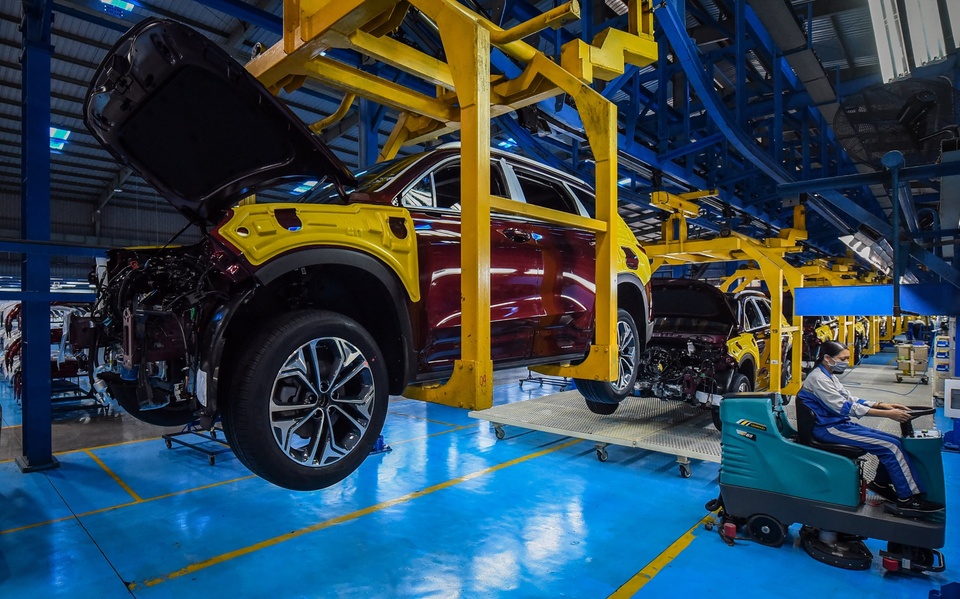
|
|
The government has agreed to reduce registration fees for domestically-produced and assembled cars by 50%. The Minister of Finance Ho Duc Phoc addressed this during the National Assembly session on June 1. The reduction in fees has received support from both the government and the Office of the Government. The Minister stated that a draft Resolution of the Government on registration fees is being prepared. However, there will not be a reduction in VAT for cars, as this policy mainly applies to essential sectors. |
In the afternoon session of the National Assembly on June 1, Minister of Finance Ho Duc Phoc explained and clarified some content related to the financial sector.
Reducing registration fees, not reducing VAT
Regarding the proposal to reduce the 50% registration fee for domestically produced and assembled cars, the Minister stated that he had submitted the proposal to the Government and the Government is also in agreement with this suggestion.
Accordingly, the Office of the Government has also sent a letter to the Minister of Finance regarding the level of registration fees for domestically produced and assembled cars.
Based on the content of the above-mentioned letter, Deputy Prime Minister Le Minh Khai has directed the Ministry of Finance to preside over and coordinate with relevant agencies to urgently prepare a draft Resolution of the Government on the level of registration fees for domestically produced and assembled cars before June 15, in accordance with the conclusions of the Government’s Standing Committee and submit to the Government.
Regarding the proposal to reduce the 2% VAT on cars, the Minister of Finance clarified that cars are subject to special consumption tax and not within the scope of Resolution 43. Therefore, cars will not be subject to VAT reduction as this policy mainly applies to essential sectors.
| |
|
Cars will not receive a 2% reduction in VAT. Photo: Viet Linh. |
Previously, the Vietnam Automobile Manufacturers Association (VAMA), the Vietnam Association of Mechanical Enterprises (VAMI), the People’s Committee of Quang Nam Province and the People’s Committee of Ninh Binh Province sent a letter to the Prime Minister, the Ministry of Industry and Trade, the Ministry of Finance and relevant agencies, in which they proposed policies to support economic recovery and development in 2023.
Accordingly, these agencies proposed that the Government extend the special consumer tax payment for car manufacturing and assembling enterprises this year, and also proposed to continue the policy of reducing the 50% registration fee for domestically produced and assembled cars.
Shortly after, the Vietnam Imported Automobiles Association (VIVA) also submitted a proposal to the National Assembly of Vietnam, the Ministry of Industry and Trade, the Ministry of Finance and the Office of the Government regarding preferential registration fees for imported cars.
The above proposals come at a time when the Vietnamese automobile market’s sales volume is showing signs of slowing compared to the same period last year.
Poor purchasing power, continuous decline in car supply
According to a report from VAMA, the entire Vietnamese market consumed a total of 92,801 cars of all types in the first four months of this year, a decrease of 30% compared to the same period in 2022.
The sales volume of domestically assembled cars reached 50,017 units, a decrease of 39% compared to the same period last year. The sales of imported cars in the Vietnamese market were also 16% lower than in the first four months of 2022, reaching only 42,784 units when the first quarter of the second quarter ended.
The weak purchasing power of the market is believed to be one of the reasons why car production in the country as well as the import of completely-built units has been affected recently.
Reports from the General Statistics Office and the General Department of Customs show that since March, the total car supply for the Vietnamese market, including imported cars and domestically assembled cars, has continuously decreased for two consecutive quarters.
| Continuous decline in car supply | ||||||
| Car supply for the Vietnamese market, including imported cars and domestically assembled cars in the first 5 months of the year (Source: General Department of Customs, General Statistics Office) | ||||||
| Label | January | February | March | April | May (estimate) | |
| Total volume of domestically produced and imported cars | units | 39757 | 35758 | 46628 | 38723 | 37000 |
Data released by the General Statistics Office shows that the total volume of new cars added to the Vietnamese market in May was estimated at 37,000 units, a decrease of 4.5% compared to the previous month.
Reports also show that after the first five months of this year, the total number of declared imported cars at Vietnam’s ports is estimated at 64,344 units with a total value of nearly $1.5 billion.
Thanks to relatively strong import activities in the first quarter, the estimated cumulative volume of imported cars until the end of May still increased by 26.7% in quantity and 16.4% in value compared to the same period last year.
Meanwhile, Vietnam’s total domestic car production in the same period was estimated at 133,600 units, a decrease of 24% compared to the first five months of 2022.
Great Books to Read in the Car
The Cars category presents readers with interesting books on various topics. During journeys with cars, it is not uncommon for us to have moments of rest, relaxation, and books are the fascinating companions.
Honda Accord: 40 Years of Automotive Excellence
Looking at the Vietnamese car market right now and humorously comparing it, we will see Camry as a well-behaved young girl, not outstanding in every aspect but easily becoming the choice of the “other half”. Teana, on the other hand, is like a dignified and tranquil woman, full of courage. Meanwhile, Mazda6 is like a hot girl, quickly attracting and captivating anyone’s gaze from the first encounter. As for Accord – with the elegance and experiences of a U30 lady, even though she is always praised by everyone, she hides something “difficult to deal with” in the minds of the majority.













































